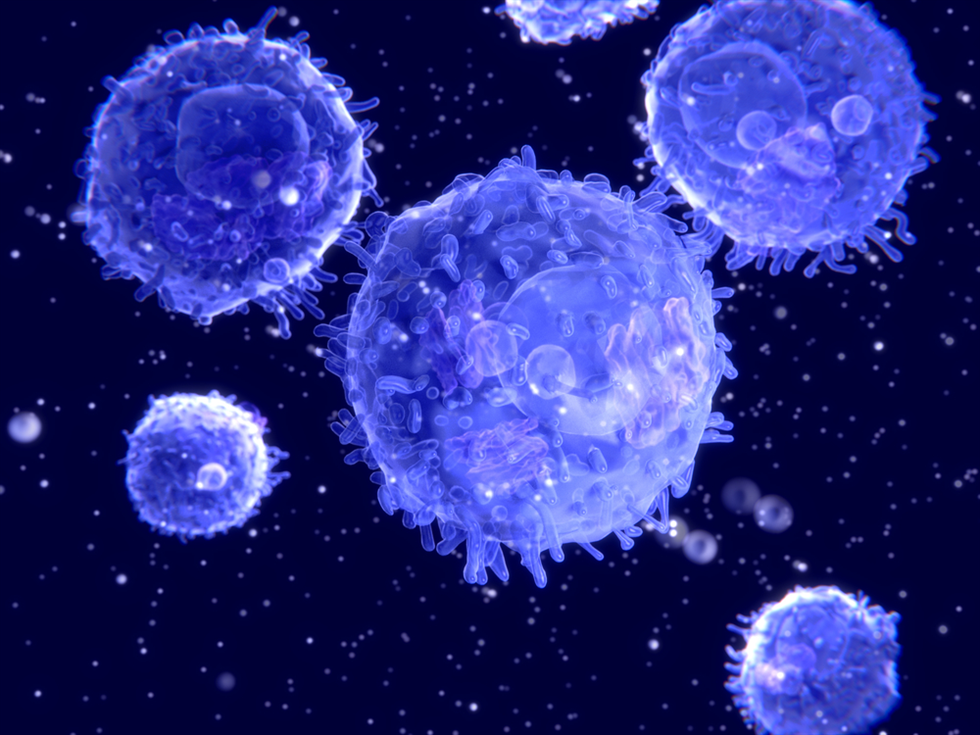Hit the Accelerator or Slam on the Brakes: Addressing Challenges in Immunotherapy

Scientists in San Francisco are using novel techniques to address why some patients and their cancerous tumors do not respond to therapy using cells from the immune system, such as these T-cells. Image: NASA
By Jeremy Rehm
SAN FRANCISCO—Our immune system’s actions resemble yours when you drive a car. It presses the “gas” enough to attack and kill foreign microbes or cancer cells, but it also steps on the “brake” to prevent killing everything—including you.
When scientists in the 1990s first discovered chemicals that control this balance, it paved the way for novel immunotherapy drugs that activate the immune system to attack tumors or temper it to prevent autoimmune disease. But immunotherapy doesn’t work for everyone, and when it does, it sometimes triggers other diseases.
“The goal now is to try and figure out the problem with those cancers or those patients that don’t respond well to these drugs,” said immunologist Jeffrey Bluestone at the World Conference of Science Journalists 2017. He spoke on 28 October at a plenary talk titled “A Delicate Balance: Immunity in Health, Disease and Medicine.”
Understanding the immune system's brakes
Bluestone, who has studied immunology for 35 years and helped pioneer immunotherapy treatments, heads the Parker Institute for Cancer Immunotherapy in San Francisco. The institute, a consortium of six top cancer centers in the U.S., aims to accelerate scientific understanding of problems in immunotherapy.
The consortium has four main goals, Bluestone said:
- To better understand when, where, and in whom the control mechanisms of the immune system work;
- To uncover which chemicals in tumors are recognized by the immune system;
- To develop therapies that can attack not only liquid tumors, but also solid tumors;
- To investigate the environments surrounding tumors, which release chemicals that might inform researchers of new paths for drug development.
Specialized cells called regulator T-cells or “T-regs” lie around tumors, producing powerful immunosuppressant chemicals that slam the immune system’s “brake” and prevent it from attacking a tumor, Bluestone noted. By selectively killing these cells around a tumor, though, the immune system is unleashed enough to produce “a dramatic effect on tumor response,” he said, but not so much that autoimmunity develops.
Gutsy research
Scientists from the institute also are developing CRISPR-engineered T-cells to inject in patients designed to attack solid tumors, which thus far have evaded immunotherapies.
But the most exciting area of research for Bluestone is not in the immune system or in tumors, but in an unexpected part of the body: the gut, where a city of bacteria unique to each person dwells. It’s called the gut microbiome.
“It’s now clear that the microenvironment in the tumor can be totally shifted depending on which kind of microbiome you have in your gut,” said Bluestone.
For example, mouse trials at the University of Chicago showed that the response of the immune system depended on the presence of a single bacterial species. That’s also predicted to be true for humans. Scientists at the Parker Institute are now packaging these bacteria so they can be introduced into patients.
Unanswered questions
Despite these promising advances, Jennifer Cox, director of engineering communication at North Carolina State University, left with unanswered questions. For 20 years, she has dealt with Sjögren’s Syndrome, an autoimmune disease that targets moisture-producing glands in the body and increases her chances of developing lymphoma. She needs immunosuppressants to tame her hyperactive immune system, but if she develops cancer, she would need boosters as well.
“Can you take an immune suppressant and an immune booster simultaneously?” Cox asked in a private conversation. “Or do you have to stop one thing and then risk having some pretty bad things happen to your body because of your immune disease?”
Her questions, and others posed by the audience, highlight the challenges scientists and pharmaceutical companies face to understand autoimmunity and cancer.
“Your points are very well taken,” Bluestone responded when asked how drug developers can keep up with fast-evolving tumors. “It’s why I can’t quit yet.”
—
Jeremy is a graduate student in the Science Communication Program at UC Santa Cruz and interns as a reporter for the Monterey Herald newspaper in Monterey, California. He has written for the journal Evolution, Mongabay, and online news at Scientific American. Follow him on Twitter @jrehm_sci.
